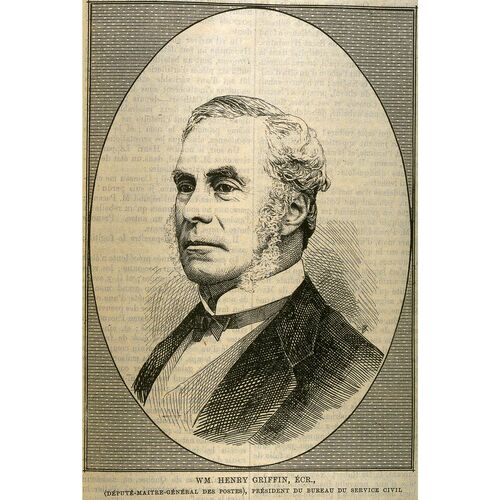GRIFFIN, WILLIAM HENRY, civil servant; b. 7 Aug. 1812 in London, son of George Griffin, army surgeon; m. and had at least two daughters; d. 4 Nov. 1900 in Claygate, Surrey, England.
The lack of information on William Henry Griffin, a man who might claim the longevity record as a public servant in Canada, illustrates the tradition of anonymity associated with the permanent public service. Griffin spent his entire career with the post office, beginning as a clerk on 24 April 1831, about a year after he had arrived in the Canadas, and retiring on 30 June 1888. For the last 20 years of his remarkable record of 57 years of service he was deputy postmaster general, the doyen of deputy ministers of the day.
When Griffin entered the post office it was directed from Whitehall as part of the imperial civil service [see Thomas Allen Stayner*]. In 1833 he became postmaster of Quebec City, and from 1 May 1835 he served as post office surveyor, or inspector, for that portion of British North America between Kingston and Fredericton. By 1838 he had also become clerk to Deputy Postmaster General Stayner. These activities prepared him to assume, on 6 April 1851, the important position of secretary of the post office in the Province of Canada, under Postmaster General James Morris*, when the department was transferred to the British North American colonies that month. During the 1850s postal service progressed quickly: postage stamps and a money-order system were introduced, the sorting of mail on railways was instituted, parcel post was inaugurated, and steps were taken to improve service to the Red River country (Man.) and the Atlantic colonies. On 12 June 1857, as part of the reorganization of postal headquarters, Griffin assumed the position of deputy postmaster general.
As a result of confederation in 1867, the post offices of Canada, Nova Scotia, and New Brunswick became the charge of the dominion government, and on 29 May 1868 Griffin was made deputy postmaster general of the enlarged operation. The following year a royal commission on the civil service complimented him on his sound management of the department. The fact that he was a member of this important inquiry suggests that he commanded the respect and confidence of his colleagues. During Griffin’s years with the dominion government, the post office, propelled by a concern for service rather than self-sufficiency in revenue, expanded rapidly: a post office savings bank was created in 1868 to meet a need for local depositories, a postal convention was negotiated with the United States in 1875, and over the entire period the headquarters staff doubled and the number of post offices grew from some 3,630 to more than 7,600. However, Griffin’s name was never attached to an annual report, and when he retired no commendation was registered either by his political superior, Postmaster General Archibald Woodbury McLelan*, or in the House of Commons. Yet he had managed the dominion government’s largest department, which provided one of the most important services at a time when physical expansion of the country was being vigorously pursued and new provinces were being admitted.
In 1880 he appeared as an expert witness before another commission on the civil service. His detailed testimony reveals an excellent grasp of the problems associated with the Canadian bureaucracy but also a cautiousness in expressing forthright criticism, which may be attributable to his management of a department that was a major source of patronage appointments. Even so, Griffin was connected with those early agencies of control and coordination which sought, however feebly, to instil in the bureaucracy principles of sound financial and personnel administration. As the head of an important revenue-producing department, in 1858 he became a member of the Board of Audit [see John Langton] and in 1864 he joined the Board of Customs, Excise, and Stamps. He sat on the Civil Service Examining Board (created in 1857 and continued after confederation), an ineffective forerunner of the Civil Service Commission established in 1908. In these varied capacities Griffin made a sizeable contribution to the long, ongoing process of shaping the public service to conform to the requirements of the developing dominion.
According to the Canadian biographical dictionary in 1880, Griffin, an Anglican and at the time president of the Civil Service Building and Savings Society, was a “man of great buoyancy of spirits, and genuine cordiality of nature.” Named a cmg in 1890 in recognition of his public service, he died in England ten years later.
NA, MG 24, I104; RG 3. Can., Post Office Dept., Report of the postmaster general (Ottawa), 1867–88. Can., Prov. of, Post Office Dept., Report of the postmaster general (Ottawa), 1851–67. Times (London), 10 Nov. 1900. Canadian biog. dict. Cyclopædia of Canadian biog. (Rose and Charlesworth), vol.1. Political appointments and judicial bench (N.-O. Coté). Canada Post, Postal service down the centuries ([Ottawa, 1974]). William Smith, The history of the Post Office in British North America, 1639–1870 (Cambridge, Eng., 1920; repr. New York, 1973) (includes portrait at p.273).
Cite This Article
J. E. Hodgetts, “GRIFFIN, WILLIAM HENRY,” in Dictionary of Canadian Biography, vol. 12, University of Toronto/Université Laval, 2003–, accessed December 20, 2024, https://www.biographi.ca/en/bio/griffin_william_henry_12E.html.
The citation above shows the format for footnotes and endnotes according to the Chicago manual of style (16th edition). Information to be used in other citation formats:
| Permalink: | https://www.biographi.ca/en/bio/griffin_william_henry_12E.html |
| Author of Article: | J. E. Hodgetts |
| Title of Article: | GRIFFIN, WILLIAM HENRY |
| Publication Name: | Dictionary of Canadian Biography, vol. 12 |
| Publisher: | University of Toronto/Université Laval |
| Year of publication: | 1990 |
| Year of revision: | 1990 |
| Access Date: | December 20, 2024 |


![WM. Henry Griffin, écr., député maître général des postes, président du bureau du service civil [image fixe] / A.S. Brodeur Original title: WM. Henry Griffin, écr., député maître général des postes, président du bureau du service civil [image fixe] / A.S. Brodeur](/bioimages/w600.5318.jpg)

